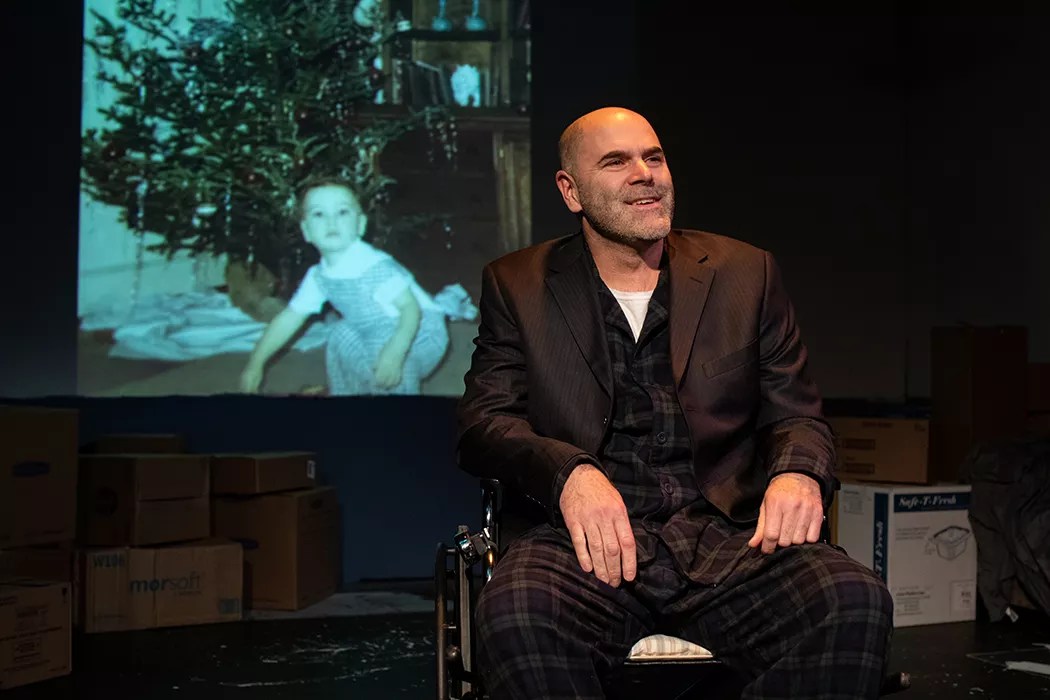
McLeod9 Creative

Audio By Carbonatix
Guy is dying. He’s in a hospital ward or hospice room, he knows we’re there watching, and for some reason he feels a compulsion to entertain us. Will Eno‘s Wakey Wakey, showing in a regional premiere at Benchmark Theatre, is a 75-minute play that somehow goes on forever for several reasons:
Because sometimes your attention flags, while at other moments you’re so riveted time seems to stop. Because the questions the play poses and the thoughts it rouses are universal, need endless pondering, and can’t be put into words. And finally, because Wakey Wakey struggles to conjure a doorway into eternity, an ambition that can obviously never be realized – but how brave and brilliant of Benchmark and director Rachel Rogers to take it on.
Guy’s room is featureless except for a large screen onto which he projects various images. It’s a transient place, and cardboard boxes are stacked against the walls as if Guy had packed for a journey. But these boxes aren’t going anywhere. They contain the unfinished projects – manuscripts, lists, plans – of “people who time ran out on.” Tick-tock.
Eno is also the author of Thom Pain (based on nothing), which was staged many years ago by the sadly missed Modern Muse Company. This is a monologue, as is most of Wakey Wakey, though a second character, Lisa -played here with charming authority by Arlene Rapal – does eventually arrive to place a cool cloth against Guy’s forehead, talk about Chinese food and do a little dance. Thom Pain, too, dealt with questions of existence and non-existence, but while the main character was caustic and mocking, Guy wants to please. His humor is gentle, his attempts to explain fervent, his admonitions kindly. He urges us to experience the small pleasures of daily life and “take care of each other” – Hallmark Card aphorisms that carry depth and urgency spoken in Guy’s faltering voice. In Thom Pain, the protagonist at one point tells the audience to check their tickets for a winning raffle number, and he’s so convincing that people start reaching obediently into wallets and pockets. Of course, there is no such ticket. Gus employs a similar trick, mentioning a pouch placed at each seat, but he’s too good-natured and exhausted to carry the joke through. Don’t bother looking, he says quickly. There are no pouches, and if there were, the contents would slime your hand.
Books have been compiled of famous last words – my favorites are Winston Churchill’s “I’m so bored with it all” and Oscar Wilde’s certainly apocryphal “Either that wallpaper goes, or I do.” So we wait for Guy to speak wisdom. But – like the thoughts of many dying people – his are fragmented and prosaic. He projects images on the screen: two little girls with ice cream cones, an unexpectedly unsettling video of animals screaming like humans that ends with a long-held operatic note. You can create context and meaning for all of this, but any interpretation will be based on your personal experiences with dying people or thoughts about your own death, not the text.
When we talk about great performances, we tend to praise vitality, passion or the kind of strong, centered presence that takes us out of our everyday lives and makes the man or woman silently reading on stage in front of us more important than whatever’s been on our minds all day: finances, love, worries, joys. What’s miraculous about Augustus Truhn‘s performance as Guy is how low-key he is. This is a fading, profoundly tired man who rouses himself with great effort now and then because of what he sees as his obligation to us. His voice is quiet, and you find yourself holding your breath and leaning forward to hear him. At the play’s end, something so deeply sad has happened that you hardly know how to deal with it. This is not catharsis, but a dark, empty silence that leaves you devastated.
You might not want to see Wakey Wakey if you’re still grieving for someone you love – and, truthfully, who of us isn’t? But you should go: It’s not often that you can experience an evening as daring and significant as this.
Wakey Wakey, presented by Benchmark Theatre through February 16, 1560 Teller Street, Lakewood, benchmarktheatre.com.